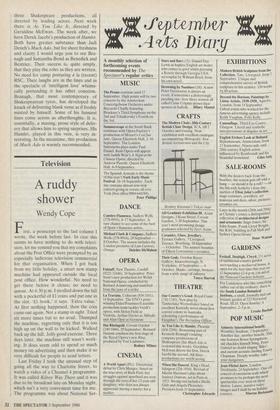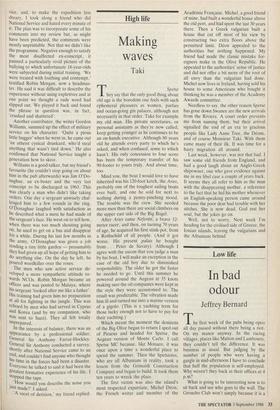Television
A ruddy shower
Wendy Cope
First, a postscript to the last column I wrote, the week before last. In case this seems to have nothing to do with televi- sion, let me remind you that my complaints about the Post Office were prompted by an especially ludicrous television commercial for that organisation. When I got back from my little holiday, a smart new stamp machine had appeared outside the local post office. How wonderful. No need to get there before it closes; no need to queue. At 6.30 p.m. I strolled down the hill with a pocketful of £1 coins and put one in the slot. '£1 book,' it says. 'Extra value.' At first nothing happened, then the coin came out again. Not a stamp in sight. Tried six more times but to no avail. Thumped the machine, regretting only that it is too high up on the wall to be kicked. Walked back up the hill. Jolly good exercise. Three days later, the machine still wasn't work- ing. It does seem odd to spend so much money on advertising and then make it so very difficult for people to send letters.
Last Friday I took the unusual step of going all the way to Charlotte Street, to watch a video of a Channel 4 programme. It was called Kilroy Was There and it was due to be broadcast late on Monday night, which isn't a very convenient time for me. The programme was about National Ser-
vice, and, to make the expedition less dreary, I took along a friend who did National Service and hated every minute of it. The plan was to incorporate some of his comments into my review but, as might have been predicted, the comments were mostly unprintable. Not that we didn't like the programme. Negative enough to satisfy the most disaffected ex-conscript, it painted a particularly vivid picture of the bullying to which unfortunate 18-year-olds were subjected during initial training. 'We were treated with loathing and contempt,' testified Robin Morgan, now a headmas- ter. He said it was difficult to describe the experience without using expletives and at one point we thought a rude word had slipped out. We played it back and found the phrase in question was, in fact, `crushed and shattered'.
Another contributor, the writer Gordon Williams, summed up the effect of military service on his character. 'Quite a pious little bugger' when he went in, he came out 'an atheist cynical drunkard, who'd steal anything that wasn't tied down.' He also confirmed that National Service taught a generation how to skive.
Williams is a good talker, but my friend's favourite (he couldn't stop going on about him in the pub afterwards) was Jim O'Do- naghue, an ex-boxer and the very last conscript to be discharged in 1963. This was clearly a man who didn't like taking orders. One day a sergeant unwisely chal- lenged him to a few rounds in the ring. O'Donaghue laughed with satisfaction as he described what a mess he had made of the sergeant's face. He went on to tell how, when there was too much shouting going on, he used to get on a bus and disappear for a while. During his last few months in the army, O'Donaghue was given a job tending a tiny little garden — presumably they had given up all hope of getting him to do anything else. On the day he left, he poured weedkiller over the roses.
The men who saw active service de- veloped a more sympathetic attitude to- wards NCOs. Robin Morgan became an officer and was posted to Malaya, where his sergeant 'looked after me like a father'. His training had given him no preparation at all for fighting in the jungle. This was echoed by men who had served in Cyprus and Korea (and by my companion, who Was sent to Suez). They all felt totally unprepared.
In the interests of balance, there was an appearance by a professional soldier, General Sir Anthony Farrar-Hockley. General Sir Anthony conducted a survey, shortly after National Service came to an e11cl, and couldn't find anyone who thought his time in the forces had been a disaster. Everyone he talked to said it had been the greatest formative experience of his life. I stopped the tape.
'How would you describe the noise you Just made?' I asked.
'A snort of derision,' my friend replied.











































 Previous page
Previous page